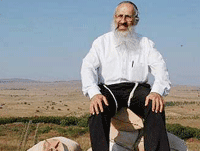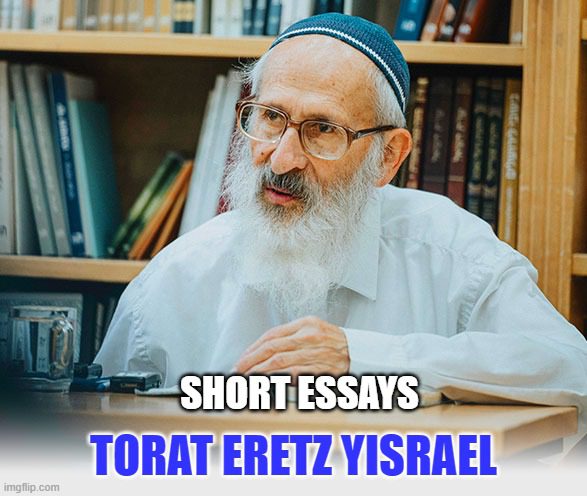Haftarah for Rosh Hashanah
First Day: Shmuel 1 1-2
by HaRav Shlomo Aviner, Head of Yeshivat Ateret Yerushalayim

The Haftarah for the first day of Rosh Hashanah describes the birth of the prophet Shmuel, the great judge who saved the Nation of Israel from a period of terrible darkness. What a dreadful period “When the judges judged” (Rut 1:1), which is explained by our Sages: “Woe to the generation when their judges are judged” (Bereshit Rabbah 42:4).
But do not despair, the judges did not commit any shameful transgressions, rather they simply lost faith in that generation. Instead of rolling up their sleeves and traveling throughout the entire length and breadth of the Land to teach Torah and ethical behavior, they preferred to lock themselves in their ivory towers. They were convinced that the spiritual struggle was lost from the outset (see Yalkut Shimoni, Shoftim 68).
There were certainly many reasons to despair about the Nation of Israel, which was ripped asunder by civil war as in the case of the prostitute in Givah (Shoftim 19-20), and also by the spiritual corruption of idol worship such as in the case of the idol of Michah in the northern part of Israel (Shoftim 17-18). The result was that the enemies of Israel routed them and cruelly ruled over large parts of Eretz Yisrael.
Out of this darkness shone the light of the spiritual giant, the prophet Shmuel, who succeeded in bringing the Nation of Israel back to the proper path, while liberating us from our permanent enemy: the Philistines. Furthermore, he prepared the kingship of Israel, the kingship of Shaul, which laid the groundwork for the permanent kingship of David. This is the great message he gave to us: Never despair (see Maamrei Ha-Re’eiyah, p. 450).
But who fashioned the wonderful personality of this judge and prophet? As in many cases, it was his parents. His mother, Chanah, is famous enough that there is no need to describe her spiritual level. But his father, Elkanah, was also a spiritual giant. What do we know about him? Only one thing: “This man would ascend from his city every year to prostrate himself and to bring sacrifices to Hashem, Master of Legions, in Shiloh; and the two sons of Eli, Chofni and Phinchas, were cohanim to Hashem there” (Shmuel 1 1:3). On the face of it, this verse seems quite ordinary: the custom of that period was to visit the Mishkan on holidays. But there is actually a lot more to it. To understand this verse, we turn to a story related by HaRav Moshe Tzvi Neriyah about Maran HaRav Kook, the first Rabbi of the reviving Jewish community in Israel.
A Torah scholar who made aliyah from America came to Maran HaRav Kook and complained about the state of Judaism in the Land of Israel. He was so distressed that he was considering leaving Israel. Maran HaRav Kook said to him: Doesn’t your honor remember the learning of his youth? The Book of Shmuel relates about Elkanah: “This man would ascend from his city every year to prostrate himself and to bring sacrifices to Hashem, Master of Legions, in Shiloh; and the two sons of Eli, Chofni and Phinchas, were cohanim to Hashem there.” Rav Kook asked two questions about this verse: 1. Why are we told in this verse that Chofni and Phinchas were there? 2. Our Sages say that Elkanah would not only go up to Shiloh, he would go around and encourage others to do so as well. Why did he have to do this? After all, isn’t ascending to the Mishkan on the holidays a Torah mitzvah? Why weren’t people following this mitzvah? Rav Kook explains that the first question is in fact the answer to the second question. The fact that Chofni and Phinchas were the cohanim in Shiloh caused people not to make the pilgrimage there, because Eli’s sons were corrupt. People said that if there were cohanim like this in this holy place, it was better not to go and see this ugliness and meet such sinners. Elkanah then came and convinced them that despite the sons of Eli and despite the sins at this holy place, they should not give up on this mitzvah of Hashem. Rather, they should strengthen this holy place. Right now there are not great people there, but later there will be. Do not give up because of the difficulties. As a reward for this act, Elkanah was blessed with a son, the prophet Shmuel, who served in the Mishkan. Rav Kook said to the Torah scholar that the same applies in relation to the holiness of the Land of Israel. Why are you angry with the Land of Israel? There are problems, therefore exert yourself and everything will work out. Although there are sinners, this is not a reason not to make aliyah and, all the more so, not to leave the Land of Israel. The more people committed to the Torah and mitzvot in the Land of Israel, the more holiness will be added to it (Chayei Ha-Re’eiyah pp. 211-212).
This story from Maran HaRav Kook’s life provides us with deep understanding and an important contemporary lesson. The Nation sometimes loses its path, but we are told to act like Elkanah, who guided the Nation to follow him to the Mishkan on the holidays (Yerushalami Berachot at the end of chap. 9). But, make no mistake aboutit, Elkanah did not spend time giving speeches on proper behavior. In his commentary on the Jerusalem Talmud, Rabbi Eliezer Azkari, who was one of the leading sages in Tzefat during its golden period, explained that Elkanah had an influence on those of his generation mainly by his example: he would go up to Shiloh with such excitement and joy, cleaving to Hashem, that it awakened a desire among others to join him. He loved the Nation of Israel, and respected it despite what he saw, and he was therefore successful in sharing his unshakeable faith with them. In the end, he merited a son who followed his path: he brought the Nation of Israel from darkness to great light.






